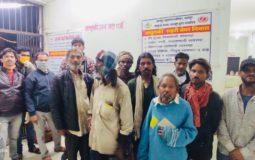
Nagpur: The decades-old dispute between the two states–Karnataka and Maharashtra have hit the headlines again. The dispute is over the control of a border town in Karnataka, called Belagavi. The matter has turned violent and bus services from Karnataka to Maharashtra were suspended partially.
What is the Karnataka-Maharashtra dispute?
The dispute goes back to the year 1956, when the states were divided on linguistic lines. Maharashtra was quite unhappy with how the borders were made and claimed Belagavi (also known as Belgaum) was a part of Bombay presidency as it had a sizable Marathi speaking population.
Maharashtra further claimed that around 814 Marathi-speaking villages which are now a part of Karnataka should be in Maharashtra. However, Karnataka refused to part with its territory.
Decades before independence, in 1881, the Kannada-speaking population was around 64 per cent and Marathi-speaking was only 26 per cent (as per the census in 1881).
In 1947, Belagavi district became a part of the Bombay state. In 1951, the linguistic population of Belagavi changed. According to the 1951 census, the population of Marathi-speaking population was more than that of Kannada-speaking.
Nine years later, after the State’s Reorganisation Act was passed in 1956, Belagavi was merged with Karnataka. Immediately, the Marathi leaders began demanding merger of the border town with Maharashtra.
In 1957, Maharashtra submitted a memorandum to the central government objecting Marathi-speaking areas going to Karnataka. Maharashtra also claimed three towns—Belagaum, Nippani and Karwar.
The central government constituted the Mahajan Commission in 1957 to intervene in the dispute. The commission report recommended that 247 villages and Belgaum should be with Karnataka and 264 villages with Maharashtra.
However, Maharashtra was unhappy with the decision and rejected the report, meanwhile Karnataka asked the board to implement it immediately.
Now enters the Maharashtra Ekkikarna Samiithi (MES) which was formed to integrate Belgaum and other towns into Maharashtra. In 2004, Maharashtra approached the supreme court to settle down the matter but the matter has been pending since then.














